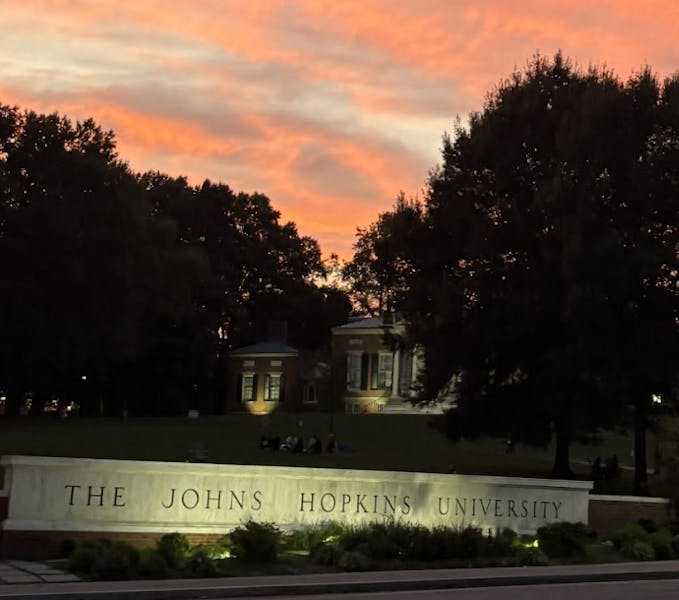
Romanticizing Hopkins: the truth behind the fantasy
What happens when the fantasy of college life collides with deadlines, midterms and pressure?"Welcome to the most depressing school in the country." "Don't go to Hopkins if you want a social life."Those were the comments I used to hear all the time, especially growing up in Maryland. Even at my own high school, Hopkins had a reputation: rigorous, competitive, isolating. People said if you wanted joy, Hopkins wasn't the place to find it.So when I arrived here, I was almost surprised by how much I enjoyed the first two weeks. There were events, activities and new friendships waiting to be built. The campus felt alive, and I allowed myself to believe that maybe those warnings were exaggerated. But then classes started. Assignments piled up. Presentations appeared on my calendar. Midterms loomed in the distance. That's when the fantasy cracked, and reality rushed in.Suddenly, every day became about due dates. I stopped reading the books I loved, watching shows or practicing the hobbies that once made me feel whole. Every moment felt like it belonged to my coursework, as if I couldn't allow myself to rest because something else was always waiting to be done.Midterms confirmed my suspicion: I wasn't prepared. Maybe none of us were. Just weeks ago, we were in high school; now, we are here, thrown into an environment that sometimes feels like constant competition. Are we competing with each other? Did we forget to be human for a moment - to stop being machines powered by grades?Hopkins is often romanticized from the outside: the brick buildings, the research reputation, the promise of opportunity. But at the end of the day, the University is just that: buildings. We, the students, are what make it a community, a home. And right now, many of us are still figuring out what that means.College is supposed to be about discovery, but sometimes it feels more like getting lost in the process. Still, even in the chaos, I remind myself: I am here for a reason. You are too.We might not have all the answers. We might fail midterms, forget assignments or collapse under the weight of stress. But we also stand up again. We wake up each morning ready to fight another day, even if it's just fueled by the smallest glimpse of hope.To anyone else who feels like they're drowning in deadlines: You are not alone. This place can be heavy, yes, but it's not just about the pressure. It's about the people who stand beside you in the dining hall after a brutal exam, the friend who texts to check in, the quiet moments of laughter that cut through the noise.Hopkins is not easy. Maybe it was never meant to be. But in the end, we are more than machines. We are more than grades. And we deserve to be here.Alexandra Garcia Herrera is a freshman from Laurel, Md. majoring in Chemistry.Her column, "Letter from a Freshman," explores her reflections on what happens outside the syllabus: friendships, identity, grief and growth.
Herrera recounts her initial weeks on campus, filled with engaging events and the promise of new friendships, leading her to believe that the warnings she'd heard about Hopkins' rigorous and isolating nature might have been exaggerated. However, the honeymoon period quickly ended as the academic workload intensified. Deadlines loomed large, assignments piled up, and midterms became an ever-present source of anxiety. The pressure to succeed consumed her time and energy, pushing aside hobbies and activities that once provided joy and a sense of self.
The column poignantly captures the feeling of being overwhelmed, a sentiment shared by many students grappling with the transition from high school to the highly competitive environment of a top-tier university. Herrera questions whether students are inadvertently competing with each other, losing sight of their humanity in the pursuit of grades.
While acknowledging the heavy weight of academic pressure, Herrera emphasizes the importance of community and connection. She highlights the small acts of kindness and support that can make a significant difference, from shared moments in the dining hall after a difficult exam to a simple text from a friend. These connections, she argues, are what truly define the Hopkins experience, transforming a collection of buildings into a community and a home.
Ultimately, Herrera's column serves as a reminder that the idealized image of college life often clashes with the realities of deadlines, midterms, and the constant pressure to perform. However, even amidst the chaos and challenges, she encourages her fellow students to remember their purpose, to support one another, and to recognize that they are more than just grades or academic achievements. The journey may be difficult, but it is a journey undertaken together.